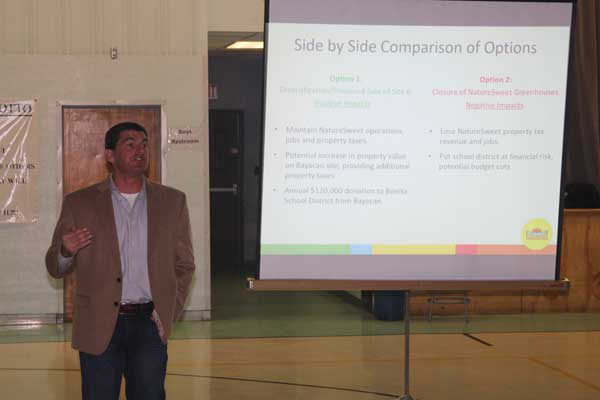BONITA — NatureSweet has to change the way it does business or there will be a significant impact on Graham County’s tax revenues, which in turn will impact both the Bonita Elementary School and Eastern Arizona College.
That was the message at a community meeting in Bonita on Thursday, delivered by Bryant Amberlang, NatureSweet’s executive chairman.
“I feel good that people showed up tonight and wanted to hear what the whole situation is. I feel better that a meeting I should have nine months ago, that we finally had it tonight,” he said. “Now it’s in this community’s hands. And that’s what the (Graham County) Supervisors said; they’re going to listen to the community and the community is going to make a decision.”
Ambelang laid out the reasoning behind his desire to sell one of the sites at the NatureSweet facility to Bayacan. He explained that the Bonita Production Plant has consistently produced negative gross margins on the product grown at the greenhouses — from a low of -9.3 percent in 2019 to a high of -74.8 percent in 2017. Last year the gross margin loss was -38.1 percent and, without changes, it’s expected to be at -24.7 percent this year.
To offset those losses, NatureSweet has been reducing staff and allowing many of the greenhouses to be dormant.
Ambelang also showed the nearly 30 people in attendance at the meeting at Bonita School how much NatureSweet has paid in taxes that go directly to the school, averaging $598,480.28 over the past eight years. Even with support from the Arizona Equalization Fund, without that contribution from NatureSweet, Bonita School would be looking at a $460,000 shortfall each year.
Meanwhile taxes paid that go to Eastern Arizona College averaged $294,758.19 over that same eight-year period.
While the discussion by most of those in attendance was opposed to Bayacan’s proposal to turn Site Six into an indoor medical-grade cannabis grow, there were a few who worried that without the diversification in crops, the loss of NatureSweet tax revenues and the influx of cash Bayacan would bring, the school would suffer.
All three members of the Graham County Board of Supervisors were in attendance, and Supervisors John Howard, R-Dist. 2, and Paul David, D-Dist. 1, said any decision they made regarding a rezoning request that could allow Bayacan to move forward would be dictated by the residents of the community.
Supervisor Danny Smith, R-Dist. 3, in whose district Bonita and the NatureSweet campus reside, said he had to leave about midway through the two-hour meeting and did not offer any comment about what Ambelang or community members said.
Ambelang closed by reiterating that whatever occurs will be the decision of the community, he just wanted them to have all the information behind his decision to sell off part of the facility to Bayacan. He also stated that NatureSweet would not be part of any cannabis grow — his company would grow tomatoes, peppers and focus on research and development.
“The question was asked, ‘Do all the teachers know? Do the parents of the students know?’ I’m not sure that the word is all the way out what the repercussions were,” Ambelang said. “On the first time this was presented as an idea, it was, ‘Are we going to allow medical cannabis to be grown in our community?’ I’m not sure they understood what the other option was. I want to make sure the community knows — the parents, the teachers —what the ramifications are of going down with (one) option.”
Bayacan was met with resistance by the community and the Graham County Planning and Zoning Commission last fall when it requested a rezoning that would have allowed the purchase of NatureSweet’s Site Six and the growing of medical-grade cannabis. When the Graham County Board of Supervisors declined to postpone action on Bayacan’s rezoning application, Bayacan withdrew its request.
When Bayacan held a job fair in Safford, more than 200 people stood in line over two days for chance to submit an application. Bayacan officials said the company would hire 150 people for the first phase of development, at a starting salary of about $35,000 per year plus benefits. At build-out, the company expects to employ about 600.
In a study commissioned by the company, Bayacan estimates the grow would have a $220 million economic impact on the region at build-out, which includes nearly $50 million in purchasing and retrofitting the property.









